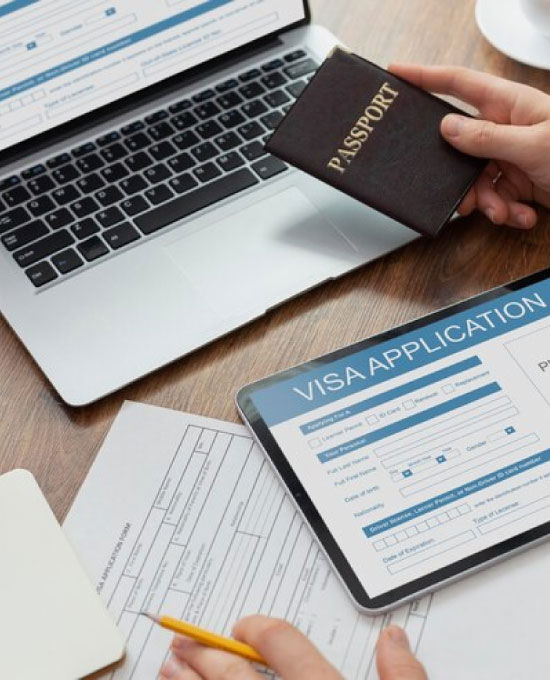
Menu
- (+971) 586532729
- (+971) 45776331
- Fly High Abroad 2302,The Prism Tower Business Bay, Dubai,UAE

Europe is widely regarded as a hub of opportunities, with its nations consistently achieving high rankings across various domains and standing out as some of the most advanced countries worldwide. The ongoing progress of these nations has resulted in the emergence of abundant employment prospects for both European residents and individuals from beyond the continent. Are you planning to work in Europe? Contact us now!
If you are a citizen of Australia, Canada, Israel, Japan, New Zealand, Switzerland, or the USA then you don’t need any visa to work in Europe. Moreover, if you are a citizen of the European Union, you also don’t need a work visa. outside them, you have to apply for a work permit visa and fulfil the eligibility criteria.
Individuals from outside the EU who desire to work in Europe can apply for a European work visa if they possess a job offer from a European employer and fulfil the qualifications stipulated by the desired host country. Since your eligibility criteria depend on the country you chose for your work permit visa application. You are welcome to contact our Europe work permit consultants for specific guidance.
Here are several of the most easily European countries for obtaining a work visa:

Typically, an EU work visa is granted for a year (12 months), with the option of extension in several European nations upon its expiration. The specific length of the work visa, however, varies based on the issuing country. Like, Denmark permits work for an indefinite job contract for up to 4 years, while Austria may grant such permits for up to 2 years.
The European Union comprises 27 member nations, each with its distinct work permit policy, and there is no general work permit applicable across Europe. Therefore, every country has its own conditions. The fundamental prerequisites for a work permit visa in Europe include:
A confirmed offer of employment from an employer within the host country.
Meeting the educational and professional qualifications required for the position.
Some countries may require proof that the job cannot be filled by a local candidate.
Often, the employer needs to provide sponsorship or support for the visa application.
A passport with sufficient validity beyond the intended stay.
Demonstrating good health and a clean criminal record.
Showing that you have adequate funds to support yourself during your stay.
Completing the application and submitting the required documents to the appropriate embassy or consulate.
Clearly define the duration and purpose of your stay, whether temporary or long-term.
Each European country may have additional criteria, so it’s essential to check the specific requirements of the country you intend to work in.
Please note that these requirements may vary depending on the country and type of work permit you are applying for. It’s advisable to consult the official website of the relevant country’s embassy or contact our Europe work permit consultants for accurate and up-to-date information.
Certainly, here’s a concise overview of the general procedure for applying for a work permit visa in Europe, broken down into five steps:

Research and select the European country where you want to work. Understand their visa requirements, the application process, and any specific regulations that apply.
Obtain a job offer from an employer based in the chosen European country. Ensure the offer aligns with your qualifications and the employer is willing to support your visa application.
Collect all necessary documents, which may include your passport, job contract, educational certificates, proof of financial stability, health insurance, and any required forms. Pay the required application fees as per the country’s guidelines.
Submit your application for a work permit to the relevant authorities in the chosen European country. This might involve an online application or submitting physical documents, depending on the country’s procedures.
If your work permit is approved, apply for a work visa from the country’s embassy or consulate in your home country. This step usually requires an interview and submission of additional documents, such as your approved work permit, passport, and visa application forms.
The duration for processing a work visa varies depending on the specific country and industry you are applying within. While certain countries may require two to six weeks for visa processing, others might extend the timeframe to eight weeks, three months, or even more.
Yes, a work visa permits you to accompany your dependents if you possess the financial capacity to sustain them and suitable housing. This encompasses the subsequent family members:
Some European nations might allow you to bring your family after a specific stay on a work visa within the country.
Europe stands out as a remarkable destination for individuals seeking work opportunities abroad. With its diverse cultures, advanced economies, and high quality of life, considering Europe for work offers a host of compelling advantages.
European countries boast robust and diverse economies, ranging from technology and finance to manufacturing and healthcare. This diversity creates a range of job prospects across various sectors, appealing to professionals with different skill sets and expertise.
Working in Europe provides exposure to a global professional network, fostering valuable cross-cultural communication and collaboration. The opportunity to work alongside people from different backgrounds enhances interpersonal skills, adaptability, and global perspective.
Many European countries consistently rank high in global quality of life indexes due to their well-developed healthcare systems, education, social services, and overall safety. This ensures a comfortable and secure living environment for both individuals and families
Europe’s rich history and diverse cultures offer a unique chance for personal growth and enrichment. The proximity of countries allows for convenient travel and exploration of new places, fostering a deeper understanding of the world.
Being surrounded by different languages in Europe creates an immersive environment for language learning. Acquiring new languages not only enhances communication skills but also opens up additional job prospects.
Europe is home to renowned research institutions and innovation hubs, making it an attractive destination for professionals in fields such as science, technology, and academia. Collaborating with leading experts can significantly boost one’s career trajectory.
European countries value work-life balance, encouraging employees to maintain a healthy equilibrium between their professional and personal lives. This approach contributes to overall well-being and job satisfaction.
Many European countries have family-friendly policies that support work-life balance for individuals with families. Parental leave, childcare facilities, and educational opportunities for children are often well-developed.
Experience gained in Europe is often highly regarded worldwide, enhancing career prospects upon returning to one’s home country or pursuing opportunities elsewhere.
Living and working in a new culture challenges individuals to adapt and grow, fostering personal development, resilience, and open-mindedness.
Over the years, European countries have successfully established a harmonious equilibrium between work and personal life, rendering them a prime preference for global job seekers.
Below are a few of the preferable European countries for employment opportunities.
Approximately 70% of Norway’s residents participate in the workforce, creating a robust employment landscape. Employers in Norway are bound to pay their staff at the close of each month based on worked hours. In cases where an employee surpasses the designated work hours, a supplementary compensation of no less than 40% of the agreed hourly wage is required. The standard working duration in Norway encompasses 9 hours within a 24-hour span, amounting to a total of 40 hours per week.

In Luxembourg, the standard workweek is set at a maximum of 40 hours, with certain sectors having specific exceptions. Additional overtime pay is mandatory. After three months of employment, workers in Luxembourg are granted four weeks of paid annual leave. Furthermore, provisions for paid maternity, parental, and sick leave are available. The country’s employment regulations strictly prohibit employers from engaging in discrimination based on factors such as gender, nationality, religion, race, or ethnic origin.
Ranked as Europe’s largest economy, Germany boasts a multitude of globally prominent enterprises, presenting abundant employment prospects. The standard workday in the country spans 8 hours, with Sunday being an exception. Germany provides paid sick leave extending up to six weeks, paid vacation time, and paternity leave, while any extra hours worked are subject to compensation by the employer.
Blending highly paid opportunities with an exceptional quality of life, Switzerland consistently ranks as a premier choice for employment. The country’s labour regulations stipulate a weekly maximum of 40 to 45 hours, according to the industry. If you exceed these hours, overtime compensation is either granted as a 25% premium or an equivalent time off. Monthly salaries are typically deposited into your bank account at the close of each month.

Opt for Fly High Abroad Dubai Consultancy for your immigration needs. With a proven track record of successful placements, we offer expert guidance and personalized support. Our experienced team navigates complex procedures, ensuring a Europe work permit. Trust our up-to-date knowledge and dedication to secure your international journey. From visa processing to settling abroad, we will assist you at each step. Join countless satisfied clients who’ve trusted us. Your aspirations, our commitment – together, we’ll make your global dreams a reality. Choose Fly High Abroad Dubai Consultancy today and embark on your extraordinary journey with confidence.